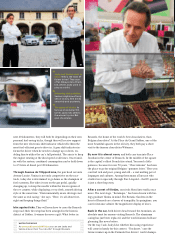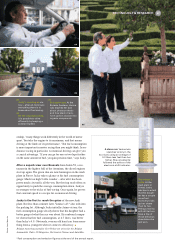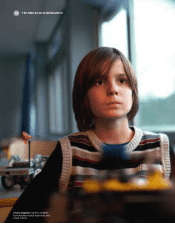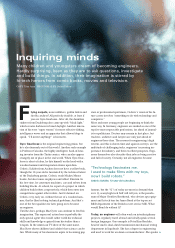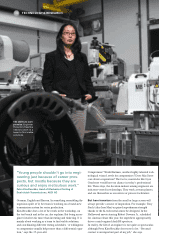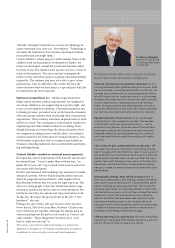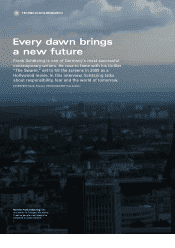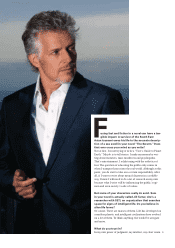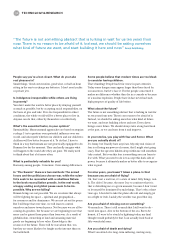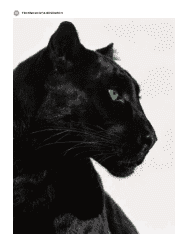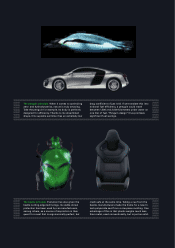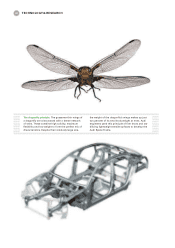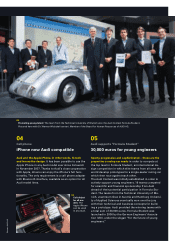Audi 2007 Annual Report Download - page 77
Download and view the complete annual report
Please find page 77 of the 2007 Audi annual report below. You can navigate through the pages in the report by either clicking on the pages listed below, or by using the keyword search tool below to find specific information within the annual report.
Alzheimer’s and dementia, definitely. But not of death itself.
Think of it: It’s actually fascinating! To me, this is going to be
the ultimate experience. I can’t escape death, so I try to look
at it in a positive light. It will be my final adventure, I want to
enjoy it.
You’re writing a new book. What’s it about?
Ssshh.
Is the sea still your subject?
As a habitat yes, but not as material for a book. I’ve said
everything I want to say about the sea, and now my thoughts
have turned elsewhere.
How does a truly brilliant creation come about –
a brilliant book, for example?
Anyone who really wants to be creative has to follow one rule
of thumb: You need to be wholeheartedly prepared to fail, to
fall flat on your face, to flop. If you can accept that, you will
be able to go wherever your own ideas take you. You will try to
get most things right, instead of striving to get as few things
wrong as possible. That’s the only way innovation can develop.
But today, that specter of fear looms everywhere – in politics,
in business, in the media. It whispers in the ears of decision-
makers, telling them to do anything rather than make any mis-
takes that might hurt their job, their share of the audience or
their share of the vote. That’s why they pre-test everything, to
make sure that nothing can go wrong afterwards. That’s ab-
surd. What these people are trying to do is to rid every idea of
its last little bit of originality, individuality, polarity. Never be
unpopular, never ruffle any feathers. The results are halfhear-
ted solutions.
To what extent should we allow public opinion to
influence our work?
Obviously, in order to be successful, you need to keep an eye
on the market, and develop some intuition. But the public will
only ever be interested in tried-and-tested formulas, which is
why many people never dare to present the public with an un-
usual idea. I think that the American movie producer Samuel
Goldwyn got it right when he said: “The public only knows
what it wants when it sees it.”
How important is marketing in generating success?
Marketing helps to sell. It can help to make products and ideas
successful, by creating attention, conveying their strengths in a
gripping, convincing way. The product itself is a question of
belief. No marketing department in the world can sell some-
thing that its own people don’t believe in. I could put the
20th new kind of butter onto the shelves. But only if I am truly
convinced that the world needs this butter. That’s the only way
I can be successful.
As the host of the three-part TV documentary “2057 –
unser Leben in der Zukunft,” you presented 500 scien-
tists’ ideas of the future. Can you tell us what your
own vision is?
We can only develop scenarios on the basis of probabilities.
But there’s one thing I do believe in, and that is that we are
merging more and more with technology. We are heading to-
wards the cyborg era, that is to say we will become mechani-
cal beings, joined to our machines. Technology is the natural
continuation of evolution. •
Frank Schätzing, writer, record producer,
advertising expert and connoisseur.
Born in Cologne (1957), graduated in communication
science and went on to work as a creative director in
the advertising industry for many years. In 1990 he
founded the Cologne-based advertising agency “Intevi”
with a partner, as well as the music production compa-
ny “Sounds Fiction.” Schätzing’s first novel, “Death and
the Devil,” was published in 1995. It was followed by
mysteries and thrillers, all set in his home city of Cologne.
He achieved international fame with “The Swarm” in
which a tormented nature rebels against mankind. To
date, his books have sold about seven million copies
and have been translated into 20 languages.
BIBLIOGRAPHY (among others): “The Swarm,”
“Nachrichten aus einem unbekannten Universum”
(News from an Unknown Universe), “Death and the
Devil,” “Lautlos” (Silent), “Mordshunger” (Starving
to Death).
Digging deeply:
Journalist Marlis
Prinzing interviews
Frank Schätzing.



